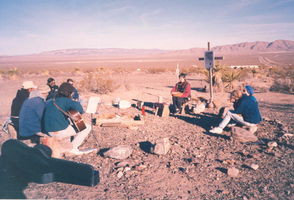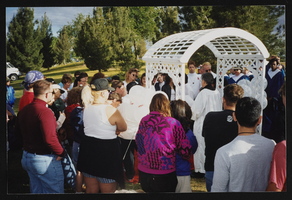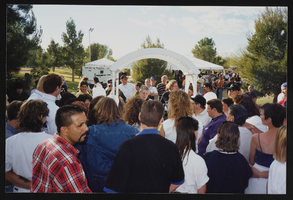Search the Special Collections and Archives Portal
Search Results
Audio clip 1 from interview with Dr Ed Goldman, April 4, 2016
Description
Dr. Goldman discusses attending services at Temple Beth Sholom and Cantor Joseph Kohn's connections on the Strip.
Jay Poster oral history interview
Identifier
Abstract
Oral history interview with Jay Poster conducted by Barbara Tabach on August 26, 2016 for the Southern Nevada Jewish Heritage Project. Poster describes his growth through his career in funeral services and his respect for the Jewish traditions of burial and grieving. He also talks about his participation in the ShabbaTones Band at Congregation Ner Tamid, and Desert Winds, a community based performance organization.
Archival Collection
Tyrone L. Seals oral history interviews
Identifier
Abstract
Oral history interviews with Tyrone L. Seals conducted by Claytee D. White and Sarah Beth Hawkins on April 25, 2016 and May 16, 2016 for the African Americans in Las Vegas: a Collaborative Oral History Project. In the first interview, Seals discusses his upbringing in Las Vegas, Nevada and growing up in the Westside. He talks about experiencing discrimination, employment limitations, and entertainment on Jackson Street. In the second interview, Seals remembers school integration, organizations for African American women, and protests during the 1960s. Lastly, Seals discusses the significance of religion in the African American community and becoming a pastor.
Archival Collection
Maria Banks oral history interview
Identifier
Abstract
Oral history interview with Maria Banks conducted by Barbara Hoyt on September 23, 1972 for the Ralph Roske Oral History Project on Early Las Vegas. Banks discusses her experiences managing a jukebox company, owning and operating two restaurants, and working for a music company. She also discusses her Mormon religion and the relationship she had with her late husband. Banks also discusses the change in climate over time, specifically the increasing humidity.
Archival Collection

Transcript of interview with Lilly Fong by Annie Yuk-Siu Shum, February 29, 1980
Date
Archival Collection
Description
Text

Sister Rosemary Lynch and unidentified protestors celebrating Ash Wednesday: photographic print
Date
Archival Collection
Description
Image

Transcript of interview with Oscar Goodman by Claytee D. White November 10, 2014
Date
Archival Collection
Description
Oscar Baylin Goodman (1939- ) is the former mayor of the city of Las Vegas, Nevada, serving 12 years until 2011, when he swore in his wife of over 50 years, Carolyn Goodman. Oscar Goodman is the official ambassador of Las Vegas, and the chairman of the Las Vegas Convention and Visitors Authority (LVCVA) Host Committee. He is also known as one of the best criminal defense attorneys in the United States, and spent 35 years defending alleged Mob figures such as Meyer Lansky, Frank Rosenthal, and Anthony Spilotro. Goodman is the primary visionary and a member of the board of directors of The Mob Museum in downtown Las Vegas, which opened in 2012. Goodman was born June 26, 1939 in Philadelphia, Pennsylvania. He earned his undergraduate degree from Haverford College in 1961 and his law degree from the University of Pennsylvania Law School in 1964. That same year he moved to Las Vegas and in 1965 he was admitted to the Nevada State Bar. He served as Clark County?s chief deputy public defender from 1966 to 1967. Goodman was elected as mayor of Las Vegas for the first time in 1999. During his three terms (the legal limit), he contributed to the economic and cultural development of the downtown area by supporting projects such as the arts district and Union Park, a high-rise residential and business project he helped to secure 61 acres of land for. He helped to begin what he called the ?Manhattanization? of downtown, which included the construction of taller buildings for better use of the area?s prime real estate. In this interview, Goodman discusses the role of Judaism in his life, from childhood to adulthood to parenting his own four children. He touches on his involvement with Temple Beth Sholom, including serving as its president, as well as in local development projects like the Lou Ruvo Cleveland Clinic Brain Health Center, Smith Center for the Performing Arts, and Mob Museum. In addition, Goodman discusses the impact of Jewish residents on the city and its development, and mentions leaders in the gaming industry, legal profession and in politics.
Text

Mass holy union ceremony performed at Gay pride, image 004: photographic print
Date
Archival Collection
Description
Image

Mass holy union ceremony performed at Gay pride, image 003: photographic print
Date
Archival Collection
Description
Image
Members of Midbar Kodesh Temple roundtable oral history interview
Identifier
Abstract
Oral history interview with Midbar Kodesh Temple members conducted by Bradley Tecktiel on April 19, 2015 for the Southern Nevada Jewish Heritage Project. Two groups of early members of Midbar Kodesh Temple in Henderson, Nevada discuss the founding of the congregation and how it serves the Jewish community. They also discuss other aspects of being Jewish in Southern Nevada.
Archival Collection
